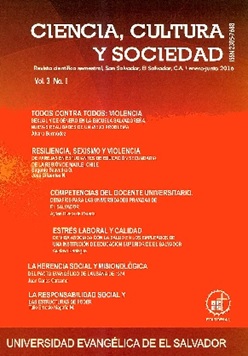Faculty Competancies: Challenges for private universities in El Salvador
DOI:
https://doi.org/10.5377/ccs.v3i1.2960Keywords:
This article aims to identify skills and academic elements of teaching university, which supply to the eminence of teaching in higher education, to propose the training strategies of teachers in private universities, showing the field elements that defineAbstract
This article aims to identify skills and academic elements of teaching university, which supply to the eminence of teaching in higher education, to propose the training strategies of teachers in private universities, showing the field elements that define the generic competencies of higher teaching. The study is descriptive, with a predominantly quantitative analysis, 384 teachers of 22 private universities in El Salvador participated, in which they were individually contacted through universities and academic headquarters. The results show teachers with knowledge, willingness and interest to contribute to education, which recognize teaching skills as the basis of university worth; also, with medium capability domain and ownership of vital elements. The concept of quality that underlies the mental depiction of teachers goes through organizational elements and infrastructure around the training of students; it also includes the responsibility the institution, the promotion of economic stimulation, education and continuous training of the faculty. Inter-university strategies are recommended to be continuously updated and to integrate the indicators to help observe the evolution of teaching quality.
Revista ciencia, cultura y sociedad Vol. 3 No. 1 enero-junio 2016, pp.33-44
Downloads
1610
Downloads
Published
How to Cite
Issue
Section
License

This work is licensed under a Creative Commons Attribution-NonCommercial 4.0 International License.
The authors give to the copyright to the journal Ciencia, Cultura and Sociedad, and copyright in all forms and media, to be notified of acceptance of your article. The authors can publish their articles in another journal after a semester published in this volume. The content of the articles is the sole responsibility of the authors. To refer to the articles correctly quote the authors.

Ciencia, Cultura y Sociedad articles are published in open access and are under a Creative Commons Attribution-NonCommercial 4.0 International License.

